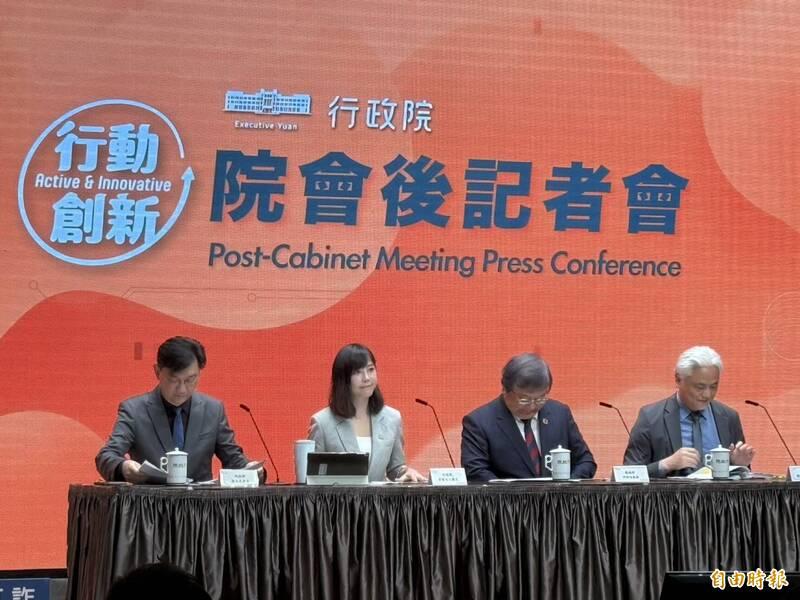In response to US tariffs on Taiwanese imports that went into effect today, Premier Cho Jung-tai (卓榮泰) today directed all ministries and agencies to support affected industries, pending the implementation of a special budget.
Companies negatively impacted by the 20-percent US tariff on Taiwanese goods can apply for the relief program starting today, part of the government’s strategy of providing immediate assistance followed by long-term planning.
On July 11, the Legislative Yuan passed the third reading of the government’s Special Act for Strengthening Economic, Social and National Security Resilience in Response to International Circumstances (因應國際情勢強化經濟社會及國土安全韌性特別條例), in response to US tariffs.

Photo: Chung Li-hua, Taipei Times
The act has a total ceiling of up to NT$545 billion (US$18.31 billion) in spending, which includes a NT$10,000 cash payment to citizens, in addition to NT$150 billion for whole-of-society defense resilience, NT$93 billion for industry and employment support, and NT$67 billion for social support.
On the question of what is to be included in the Executive Yuan’s budget proposal, it said that other than adjustments to the industrial support program, the budget is to be based on what the legislature previously passed.
Cho said the government remains in discussions with the US on issues like reciprocal tariffs and supply chain cooperation.
In a news conference today, Executive Yuan spokesperson Michelle Lee (李慧芝) said that the special budget was not part of today’s meeting pending some adjustments that need to be made to the industrial support plan.
The rest of the special act would remain unchanged, she added.
On Thursday last week, Lee said that the Executive Yuan would ask the constitutional court to review the cash handout provision of the special act.
In response to questions about that announcement, Lee today said that the Executive Yuan would continue to communicate and work through legal channels.
The government does not have an unlimited budget, Democratic Progressive Party caucus chief executive Rosalia Wu (吳思瑤) said.
There are still questions that remain unanswered, such as whether wealthy families would be excused from the cash payment and the constitutionality of the special act, Wu said.
Additional reporting by Chen Cheng-yu

The Coast Guard Administration (CGA) yesterday said it had deployed patrol vessels to expel a China Coast Guard ship and a Chinese fishing boat near Pratas Island (Dongsha Island, 東沙群島) in the South China Sea. The China Coast Guard vessel was 28 nautical miles (52km) northeast of Pratas at 6:15am on Thursday, approaching the island’s restricted waters, which extend 24 nautical miles from its shoreline, the CGA’s Dongsha-Nansha Branch said in a statement. The Tainan, a 2,000-tonne cutter, was deployed by the CGA to shadow the Chinese ship, which left the area at 2:39pm on Friday, the statement said. At 6:31pm on Friday,

The Chinese People’s Liberation Army Navy’s (PLAN) third aircraft carrier, the Fujian, would pose a steep challenge to Taiwan’s ability to defend itself against a full-scale invasion, a defense expert said yesterday. Institute of National Defense and Security Research analyst Chieh Chung (揭仲) made the comment hours after the PLAN confirmed the carrier recently passed through the Taiwan Strait to conduct “scientific research tests and training missions” in the South China Sea. China has two carriers in operation — the Liaoning and the Shandong — with the Fujian undergoing sea trials. Although the PLAN needs time to train the Fujian’s air wing and

The American Institute in Taiwan (AIT) put Taiwan in danger, Ma Ying-jeou Foundation director Hsiao Hsu-tsen (蕭旭岑) said yesterday, hours after the de facto US embassy said that Beijing had misinterpreted World War II-era documents to isolate Taiwan. The AIT’s comments harmed the Republic of China’s (ROC) national interests and contradicted a part of the “six assurances” stipulating that the US would not change its official position on Taiwan’s sovereignty, Hsiao said. The “six assurances,” which were given by then-US president Ronald Reagan to Taiwan in 1982, say that Washington would not set a date for ending arm sales to Taiwan, consult

A Taiwanese academic yesterday said that Chinese Ambassador to Denmark Wang Xuefeng (王雪峰) disrespected Denmark and Japan when he earlier this year allegedly asked Japan’s embassy to make Taiwan’s representatives leave an event in Copenhagen. The Danish-language Berlingske on Sunday reported the incident in an article with the headline “The emperor’s birthday ended in drama in Copenhagen: More conflict may be on the way between Denmark and China.” It said that on Feb. 26, the Japanese embassy in Denmark held an event for Japanese Emperor Naruhito’s birthday, with about 200 guests in attendance, including representatives from Taiwan. After addressing the Japanese hosts, Wang